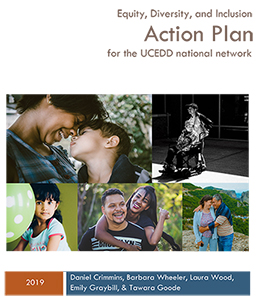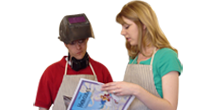Cultural Competency & Inclusion
Recognizing and valuing the unique perspectives of people, identities, and points of view, and doing so in an environment where all people feel safe and respected is an important part of our work to address and eliminate barriers to systems and services. Following are select resources compiled and/or created by AUCD to increase diversity and ensure cultural and linguistic competence in our publications and events. AUCD members and the general public are encouraged to read, cite, and implement these ideas in their work.
Diversity and Inclusion Toolkit
 Recently, AUCD rolled out its Diversity and Inclusion Toolkit. The Toolkit is a website that provides concrete objectives, strategies, and resources to help you realize your goals related to diversity, equity, inclusion, and cultural and linguistic competence. Strategies and resources are aligned with the roles of three specific audiences, one of which, university-based centers, is designed to cater directly to Leadership in Neurodevelopmental and Related Disabilities (LEND) and University Centers for Excellence in Developmental Disabilities Education, Research, and Service (UCEDD) programs.
Recently, AUCD rolled out its Diversity and Inclusion Toolkit. The Toolkit is a website that provides concrete objectives, strategies, and resources to help you realize your goals related to diversity, equity, inclusion, and cultural and linguistic competence. Strategies and resources are aligned with the roles of three specific audiences, one of which, university-based centers, is designed to cater directly to Leadership in Neurodevelopmental and Related Disabilities (LEND) and University Centers for Excellence in Developmental Disabilities Education, Research, and Service (UCEDD) programs.
Equity, Diversity, and Inclusion Action Plan for the UCEDD National Network The UCEDD network has the capacity to reduce disparities, improve outcomes, and promote a more equitable, diverse, and inclusive society for individuals with developmental disabilities and their families from historically underserved groups. This Action Plan identifies four areas of focus with objectives and action steps for network members to address: (1) workforce diversity, (2) cultural and linguistic competence, (3) state/local impact, and (4) crosscutting considerations that apply to all efforts.
The UCEDD network has the capacity to reduce disparities, improve outcomes, and promote a more equitable, diverse, and inclusive society for individuals with developmental disabilities and their families from historically underserved groups. This Action Plan identifies four areas of focus with objectives and action steps for network members to address: (1) workforce diversity, (2) cultural and linguistic competence, (3) state/local impact, and (4) crosscutting considerations that apply to all efforts.
![]() This project is designed to research, develop, and disseminate a set or resources for the national network of University Centers for Excellence in Developmental Disabilities (UCEDDs) to embed cultural diversity and cultural and linguistic competence (CLC) in their curricula and training activities. The project will build the capacity of network programs to embed widely accepted CLC policies, structures, and practices across the four UCEDD core functions of pre-service training and continuing education, community services, research, and information dissemination. The project has a special focus on unserved and underserved communities in the United States, its territories, and tribal communities. This project is conducted in collaboration with key stakeholders in the UCEDD network and funded by the Administration on Intellectual and Developmental Disabilities, Administration for Community Living, U.S. Department of Health and Human Services (insert link).
This project is designed to research, develop, and disseminate a set or resources for the national network of University Centers for Excellence in Developmental Disabilities (UCEDDs) to embed cultural diversity and cultural and linguistic competence (CLC) in their curricula and training activities. The project will build the capacity of network programs to embed widely accepted CLC policies, structures, and practices across the four UCEDD core functions of pre-service training and continuing education, community services, research, and information dissemination. The project has a special focus on unserved and underserved communities in the United States, its territories, and tribal communities. This project is conducted in collaboration with key stakeholders in the UCEDD network and funded by the Administration on Intellectual and Developmental Disabilities, Administration for Community Living, U.S. Department of Health and Human Services (insert link).
ITAC Training Toolbox - Cultural and Linguistic Competence This resource makes it easy for program staff to browse and share both proven and innovative training strategies/activities on a variety of topics relevant to
This resource makes it easy for program staff to browse and share both proven and innovative training strategies/activities on a variety of topics relevant to
leadership and Maternal and Child Health. In the Toolbox, training strategies are categorized by topic, making it easy for you to browse different methods other programs use to teach important concepts to their trainees. You can also save strategies you feel could be applicable in your program to a folder of your personal favorites.







